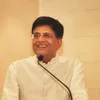WTO reform process should not undermine its basic principles: Commerce and Industry Minister Piyush Goyal
Speaking at a meeting of G20 trade ministers in Japan, Commerce and Industry Minister Piyush Goyal said in the reform process of the WTO concerns of all member countries must be accommodated.
India on Sunday said that the World Trade Organization (WTO's) reform process should not dilute the basic principles of providing special and differential treatment to developing countries as well as consensus-based decision making.
Speaking at a meeting of G20 trade ministers in Japan, Commerce and Industry Minister Piyush Goyal said in the reform process of the WTO concerns of all member countries must be accommodated.
"India believes that the reform process should not undermine the WTO's fundamental principles, namely, 'Special and Differential Treatment' (S&DT), consensus based decision making and objective of development," he said.
Goyal said the reform process should begin with reviving the dispute settlement mechanism of the Geneva-based body, which frames rules for global trade, by allowing re-nomination of appellate body members at the earliest.
The statement assumes significance as the US has called for reforming WTO. The US wants formulation of some guidelines that countries with high economic growth are prevented from taking benefits of S&DT, which is meant for developing nations.
It has submitted its suggestions that self-declaration of member countries as developing economies to avail S&DT benefits puts the 164-member multilateral body on a path to failed negotiations and it is also a path to institutional irrelevance.
The S&DT allows developing countries to enjoy certain benefits, including taking longer time periods for implementing agreements and binding commitments, and measures to increase trading opportunities.
Further, the US has also put roadblocks in appointment of new members in the appellate body of WTO's dispute settlement system.
The minimum quorum (3) for functioning of this body will end on December 10, after which it will become dysfunctional.

Commerce and Industry Minister Piyush Goyal (Source: Facebook)
"The dispute settlement mechanism, which is the mainstay of the WTO, underscores the principle of sovereign equality of all nations, which we are all committed to uphold," Goyal said.
He said that the current proposals on WTO reform do not take into consideration the challenges and aspirations of developing countries.
"Therefore, we need to build confidence among member countries and develop an agenda which encompasses all such concerns," he said.
The minister also said the joint initiatives that have been formed outside WTO with no mandate set an unhealthy trend of influencing rule making within the organisation.
"I am suggesting we must collectively look at mainstreaming these discussions in the WTO after informal consultations. The G20 should commit to support only WTO consistent rules and avoid creating unsurmountable goals. They should remain consistent with WTO rules and not go beyond till such boundaries are re-negotiated and revised," he said.
Further talking about current trade developments, he said the slowdown in global trade and investment is of "serious concern" as it adversely affects economic growth, development, and job creation.
"The ongoing trade tensions is adversely affecting confidence of businesses around the world. Developing countries, particularly least developed countries, are vulnerable in this vitiated environment," he said.
India joins other nations in calling for de-escalating trade tensions and reviving confidence in the rules based multilateral trading system, he said.
Goyal said the rise in protectionist practices is jeopardising free trade and investment.
"The excessive use of non-tariff barriers, both spoken and unspoken, is seriously impeding market access opportunities for developing countries," he said, adding, "We need to remove barriers and facilitate temporary movement of highly skilled professionals to sustain this investment and growth."
On agricultural subsidies, he said there is a need make a clear distinction between WTO compatible and non-compatible trade practices in assessing market distorting measures.
"We are concerned about the domestic support provided to agriculture by some developed countries, which cause instability in trade leaving narrow scope for developing countries to access agri-markets," he said.
There is also a need for greater transparency on subsidies, both direct and indirect, given to merchandise exports.








